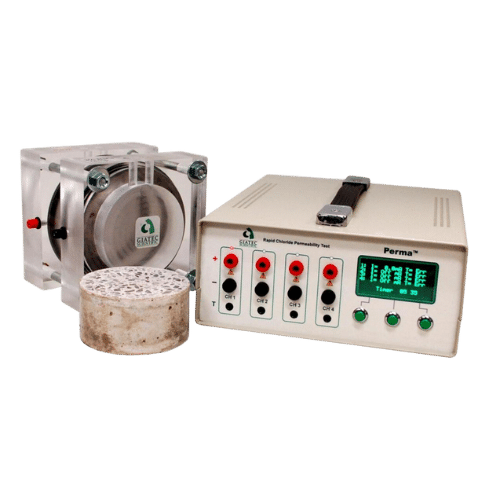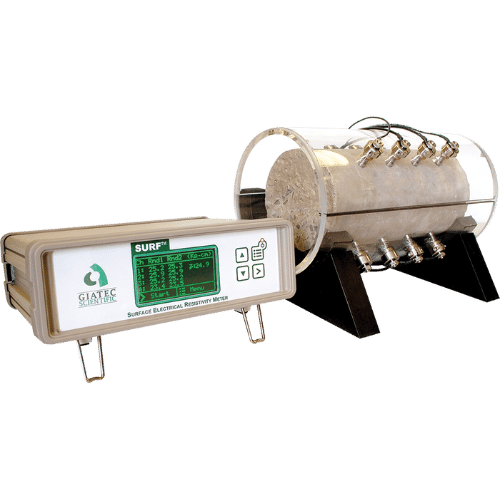GIATEC RCON™
Evaluate Your Concrete’s Permeability in Less Than 5 Seconds
Bulk resistivity testing of concrete is crucial for assessing its ability to resist ionic transport, which relates to the risk of corrosion in embedded steel reinforcement. High resistivity indicates lower porosity and permeability, enhancing durability, especially in aggressive environments. Bulk resistivity testing informs mix design and material selection, providing advanced insights in optimizing concrete for structures in specific environmental conditions. Overall, bulk resistivity testing is essential for evaluating the longevity and safety of concrete structures.
The RCON is the leading device for measuring the bulk resistivity of your concrete via the uniaxial technique. When using the uniaxial technique to understand durability properties of your concrete, it is important to apply an AC current at the correct frequency with a phase angle closest to 0 degrees. A measured resistance with a phase angle of or close to 0 is desirable to understand the normal resistance of concrete which is corelated with the durability characteristics of concrete. The RCON can apply a sweeping frequency which outputs a range of resistance values and their corresponding phase angles. This allows the user to select the desired frequency for their concrete specimen, outputting the most accurate results.
Further, the RCON can measured the resistivity of fresh concrete, helping users understand the setting times of cement mortars and concrete.
Applications:
-
Diffusion of chloride in concrete.
-
Rebar corrosion in concrete.
-
Setting time of fresh concrete.
-
Moisture transfer in concrete.
-
Curing of concrete.
-
Cathodic protection design.
Software:
-
AC measurement (Galvanostatic).
-
Phase detection (0-180 degree).
-
Accurate data (±2%).
-
Continuous measurement.
-
Free user-friendly PC programe.
Hardware:
-
Fast measurement (<5 seconds).
-
Stand-alone operation device.
-
Flexible sample holders.
-
Customizable setup.
Compliance & Approvals:
-
AASTM C1876 – Standard Test Method for Bulk Electrical Resistivity or Bulk Conductivity of Concrete
-
AASHTO TP 119 – Standard Method of Test for Electrical Resistivity of a Concrete Cylinder Tested in a Uniaxial Resistance Test
-
CSA A23.3 – 26C – Concrete Materials And Methods Of Concrete Construction / Test Methods And Standard Practices For Concrete
To discover how Giatec RCON can improve the accuracy and efficiency of your concrete resistivity testing, contact CE Construction Solutions for more information on advancing the durability and lifespan of your concrete projects.
BROCHURE USER MANUAL DATASHEET CONTACT US
GIATEC PERMA™
Rapid Chloride Permeability Testing
The Rapid Chloride Permeability Test (RCPT) is the most widely used standardized method to assess concrete’s permeability to chloride ions, which indicate corrosion susceptibility. In the test, a concrete specimen is subjected to voltage while immersed in a sodium chloride solution, measuring the chloride that permeates over time. Results classify the concrete’s permeability levels, guiding decisions on its suitability for chloride-prone environments, such as coastal areas or locations using de-icing salts. By evaluating rapid chloride permeability, engineers can enhance durability and lifespan through informed mix designs and protective measures.
Perma™ is a sought-out device for chloride permeability testing based on its robust, durable design, 4-channel option, and flexible logging intervals. Whether you’re a construction materials lab, a concrete producer, or a researcher, the Perma is the device for your chloride permeability testing needs.
Applications:
-
Measurement of chloride penetration resistance.
-
Bulk electrical conductivity of concrete.
-
Performance-based quality control of concrete.
-
Estimation of chloride migration and diffusion coefficient of concrete.
-
Service life design of concrete structures.
Software:
-
Automatic temperature control system.
-
Accurate (± 0.1 mA).
-
Flexible logging interval time (1 to 10 min).
-
Free user-friendly PC software.
Hardware:
-
Four measurement channels
-
Customizable setup
-
Verification kit included
-
Stand-alone operation device
-
Auto-sealable cells with rubber gasket and spacer
Compliance & Approvals:
-
AASTM C1202 – Standard Test Method for Electrical Indication of Concrete’s Ability to Resist Chloride Ion Penetration
-
AASHTO T277 – Standard Method of Test for Electrical Indication of Concrete’s Ability to Resist Chloride Ion Penetration
-
ASTM C1760 – Standard Test Method for Bulk Electrical Conductivity of Hardened Concrete
-
ASTM C1556 – Standard Test Method for Determining the Apparent Chloride Diffusion Coefficient of Cementitious Mixtures by Bulk Diffusion
To discover how Giatec RCON can improve the accuracy and efficiency of your concrete resistivity testing, contact CE Construction Solutions for more information on advancing the durability and lifespan of your concrete projects.
BROCHURE USER MANUAL CONTACT US
GIATEC SURF™
Reliable Surface Resistivity Results to Understand Your Concrete’s Durability
Electrical surface resistivity testing of concrete is essential for evaluating the material’s susceptibility to moisture and ion penetration, which are critical factors in the corrosion of embedded steel reinforcement. This testing provides a quick and non-destructive method to measure the resistivity of the concrete surface, offering insights into its durability and long-term performance. High surface resistivity typically indicates lower permeability, suggesting that the concrete can effectively resist the ingress of harmful substances, such as chlorides and sulfates, which can lead to corrosion and degradation. Additionally, the test results can guide decision-making in mix design, construction practices, and maintenance strategies, particularly in environments where concrete is exposed to moisture or de-icing chemicals. By understanding the electrical surface resistivity, engineers and construction professionals can make informed choices to enhance the durability and longevity of concrete structures, ultimately leading to safer and more reliable infrastructure.
The SURF is the quickest and most reliable device to measure the surface resistivity of your concrete specimens. Employing a sample holder with four Wenner-Array’s positioned at 90 degrees around the specimen, the SURF can perform the required 8 measurements per AASHTO T358 in a matter of seconds. This reduces human error seen with hand-held single Wenner-Array devices, where a user needs to perform 8 manual measurements around the specimen, promoting surface drying which can negatively affect results.
Applications:
-
Performance-based quality control of concrete.
-
Estimation of chloride diffusion of concrete.
-
Service life design of concrete structures.
-
Crack detection in concrete.
-
Water content of fresh concrete.
Software:
-
Accurate data (±2%).
-
Variable frequency (13 – 100 Hz).
-
Automatic report generation.
-
Free user-friendly PC software.
Hardware:
-
Optional hand-held probe.
-
Fast measurements (8 measurements < 15s).
-
Four-channel four-probe surface resistivity meter.
Compliance & Approvals:
-
AASTHO T358 – Standard Method of Test for Surface Resistivity Indication of Concrete’s Ability to Resist Chloride Ion Penetration
To learn how Giatec Surf can elevate your concrete’s durability performance and permeability testing, contact CE Construction Solutions for more information on enhancing the longevity and resilience of your concrete structures.
BROCHURE USER MANUAL CONTACT US
